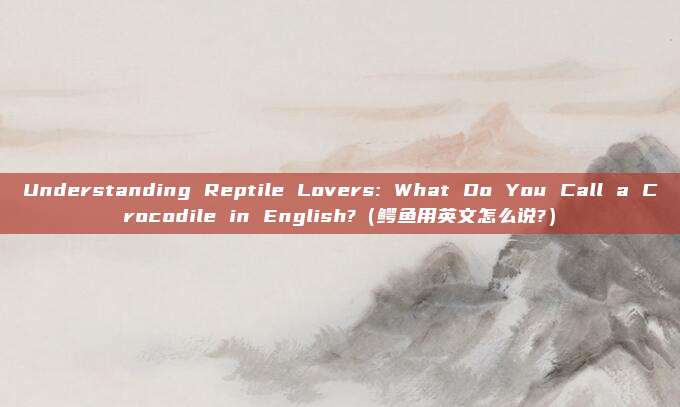Understanding Reptile Lovers: What Do You Call a Crocodile in English?(鳄鱼用英文怎么说?)
温馨提示:这篇文章已超过216天没有更新,请注意相关的内容是否还可用!
Content:
In the vast world of reptiles, the crocodile stands out as a fearsome and intriguing creature. For those who are passionate about these scaly beings, understanding the correct terminology is crucial. If you've ever wondered, "What do you call a crocodile in English?" you've come to the right place. This article delves into the English terminology for crocodiles, related words, and offers some interesting facts about these ancient reptiles.
The Correct Term: Crocodile
The most straightforward answer to the question "What do you call a crocodile in English?" is simply "crocodile." This term is widely recognized and used across various English-speaking regions. Whether you're referring to the American alligator or the Nile crocodile, the general term "crocodile" covers them all.

Synonyms and Related Terms
While "crocodile" is the primary term, there are several synonyms and related words that can be used in different contexts:
1、Alligator: While not a crocodile, the American alligator is often mistaken for one, especially in the United States. Therefore, "alligator" can be used as a term for crocodiles, particularly in American English.
2、Croc: This is a colloquial term used in Australia and New Zealand. It's a shortened form of "crocodile" and is commonly used in popular culture, such as the hit movie "The Crocodile Dundee."
3、Crocodylus: This is the scientific genus that includes all crocodiles. While not a common term in everyday speech, it is used in scientific literature and discussions.
4、Gavial: A species of crocodile native to the Indian subcontinent, known for its long snout. It's a specific term used to describe this particular species.
5、Caiman: Another genus of crocodiles, primarily found in Central and South America. "Caiman" is used to refer to this specific type of crocodile.
Fascinating Facts About Crocodiles
Crocodiles are ancient reptiles that have been around for over 200 million years. Here are some fascinating facts about these creatures:
Diet: Crocodiles are apex predators and feed on a variety of prey, including fish, birds, mammals, and even other reptiles. They have a powerful jaw and sharp teeth, making them formidable hunters.
Reproduction: Crocodiles are known for their elaborate courtship rituals and nest-building behavior. They lay eggs in a mound of vegetation, and the mother crocodile guards the nest until the eggs hatch.
Speed: Despite their bulk, crocodiles are incredibly fast and can reach speeds of up to 30 miles per hour in short bursts.
Endangered Species: Some species of crocodiles are endangered due to habitat loss, hunting, and other human activities. Conservation efforts are underway to protect these ancient reptiles.
Conclusion
Understanding the correct terminology for crocodiles is essential for reptile enthusiasts and anyone interested in these fascinating creatures. Whether you're using the common term "crocodile," the colloquial "croc," or the scientific "Crocodylus," knowing the right words can enhance your knowledge and appreciation of these ancient reptiles. Remember, crocodiles are not just another animal; they are a part of Earth's rich biodiversity that has evolved over millions of years.
网站文章、图片来源于网络,以不营利的目的分享经验知识,版权归原作者所有。如有侵权请联系删除!





还没有评论,来说两句吧...